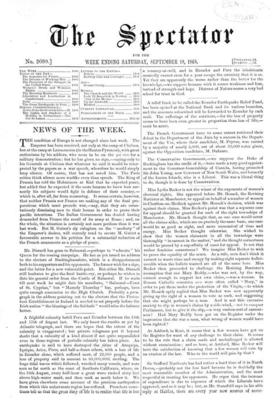Miss Lydia Becker is not the wisest of the exponents
of women's electoral rights. She appeared before Mr. Hosack, the Revising Barrister at Manchester, to appeal on behalf of a number of women in Chorlton-on-Medlock against Mr. Hosack's decision, which was against their claims. Miss Becker's point was that a separate case for appeal should be granted for each of the eight townships of Manchester. Mr. Hosack thought that, as one case would cover all the claims alike, which are on precisely the same basis, one case would be as good as eight, and more economical of time and energy. Miss Becker thought otherwise. She wished to show that the women claimants in all the townships were thoroughly "in earnest in the matter," and she thought earnestness would be proved by a superfluity of cases for appeal. Is not that rather feminine earnestness ? We imagine Miss Becker to wish to prove the equality of the sexes. As a rule, men don't think it earnest to waste time and energy by making eight separate bullet- moulds when the bullets wanted are all of the same bore. Miss Becker then proceeded to challenge the Revising Barrister's assumption that one Mary Boddy,—who was not, by the way, earnest enough to support her own claim,—was a woman. In Roman Catholic countries men were often called "Mary," in order to put them under the protection of the Virgin,—to which Mr. Hosack aptly replied that Miss Becker was now apparently giving up the right of a woman to vote as such, and suggesting that she might perhaps be a man. And is not this excessive anxiety to slip in women's claims by a side-wind, —not to conquer Parliament, but to give it the slip,—a very curious sort of earnest- ness? Had Mary Boddy been got on the Register under the impression that she was a man, what wrong of women would have been righted ?






























